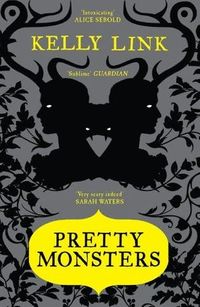 The frequently miraculous Kelly Link–needless to say, one of my favorite writers and favorite people–is blog touring here and there this week to support the paperback release of her YA collection Pretty Monsters. Which you should all pick up immediately, and psst, completists, it even includes an additional story.
The frequently miraculous Kelly Link–needless to say, one of my favorite writers and favorite people–is blog touring here and there this week to support the paperback release of her YA collection Pretty Monsters. Which you should all pick up immediately, and psst, completists, it even includes an additional story.
Her first post at the Cozy Reader is quite amazing, and offers part one of what she's been doing since the collection published:
Ursula was born on February 23, 2009, at twenty-four weeks, after a complicated pregnancy. I had checked out What To Expect When You’re Expecting from our library early on, but I hadn’t even gotten to the section on labor when I went into labor. We had barely begun to think about names. I liked Fern, because of Charlotte’s Web. My husband and I both liked Gulliver, if it turned out I was having a boy. (The ultrasounds were cloudy. Ask again later.) We both liked Ursula, because it meant little bear, and because we both loved the books of Ursula K. Le Guin.
You'll want to read the rest, and I defy you to skip part two.
Updated: I'm going to add links for each day as I see them.
Day Two: Part two: "I didn't write any stories during this period. Maybe this is because the kinds of stories that I write don't have the kind of happy, conclusive ending that I longed for, so badly, for so many months, in my own life. Maybe I didn't write because it was always going to be hard to write while you are a new parent."
Day Three: Part One: "Me, I've always been concerned about the fact that I can't drive stick shift. Come the zombie apocalypse, or the werewolf attack, I'll be the one sitting in the driver’s seat of the getaway car, crying hysterically while I flood the clutch." Part Two: Lists of favorite romances, paranormal romances, and movies and TV that mix fantasy and romance.
Day Four: Advice for writers on reading: "Read awful books. No, seriously. Read them out loud, with friends, if you can. Identify the ways in which you can learn from them. My favorite awful book? Micah by Laurel K. Hamilton (I am not going to say that her other books are awful, by the way. But this one is astonishingly — and usefully – and wonderfully — horrible. I highly recommend it.)"
Day Five: A short interview: "I still read Joyce Ballou Gregorian's Tredana trilogy every few years, mostly because she died much too young, and so there are only those three books. They mean a ton to me."
Day Six: On generating story ideas: "Kate Wilhelm is a writer of mystery novels, classic science fiction novels like Where Late the Sweet Bird Sang, a short-story writer, and an anthologist. Along with her husband Damon Knight, she co-founded the Clarion Workshop. Although she was no longer an instructor when I went to Clarion in 1995, one of the most useful pieces of writing advice I've ever come across was something Wilhelm said. To roughly paraphrase, she suggests that every writer indirectly collaborates with her subconscious — she calls this collaborator your Silent Partner — who supplies you with ideas that you then turn into stories."
Day Seven: In which Kelly interviews N.K. Jemisin. No excerpt, because just go read it and then read Nora's book like I already told you.
Day Eight: On discovering Diana Wynne Jones: "At this age, even though I can't quite keep the names of authors straight in my head, I am beginning to develop a theory that writers with three names (or at least two initials) are good bets when it comes to fantasy. (Probably why I will eventually pick up Joyce Ballou Gregorian's books, as well as P. C. Hodgell's, in a few years, and then Karen Joy Fowler's collection Artificial Things. Eventually I am also partial to interesting and distinctive names, like Piers Anthony, or Tanith Lee, maybe because they are easier to remember. By the time I'm fifteen or sixteen, I'm fully invested in the cult of the author: if a bio reveals that an author has a horse, or cats, or lives in a castle — better yet, all three — I'll give their book a try.)"
Day Nine (the last day): On making zines: "What I would really love to see are some YA zines — there are a lot of good blogs where you can go and find people talking about YA fiction, but there still aren't a lot of venues that publish YA short fiction, or for that matter, young adult writers who are beginning to write fiction."
(So, I only listed the stops here that had posts to them, which means maybe one giveaway site where I couldn't find the post might be missing. Gavin's list contains all the blogs that participated.)
